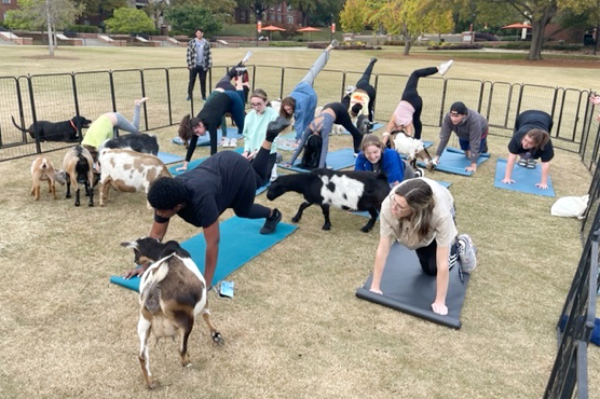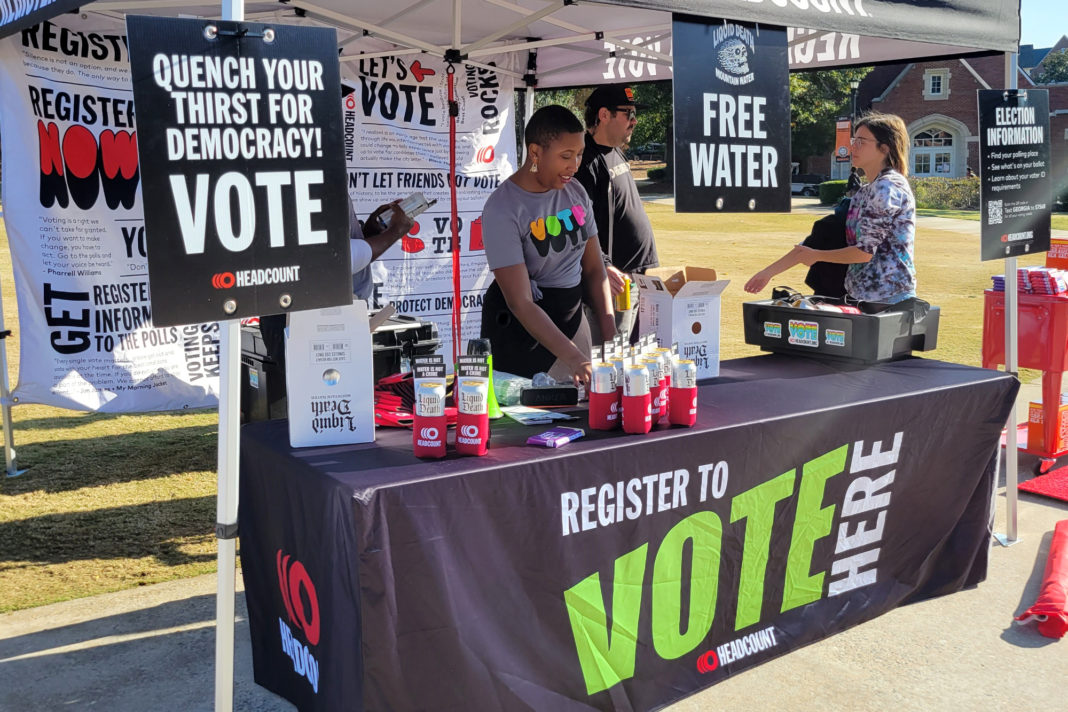In recent years, Mercer University’s faculty, staff and students have been working cohesively to increase student voter engagement.
Lauren Shinholster, associate director of engaged learning, has been overseeing Mercer’s voter engagement initiatives for the past six years. While the University has always been involved in voter engagement work, it was not until the 2016 presidential election that the institution began to see that work become more structured by a particular program.
That student-run organization, called Mobilize Mercer, recently transitioned into the Mercer Votes Coalition, a group of faculty, staff and students who have taken ownership of strengthening the school’s voter turnout.
“I believe that Mercer’s voter engagement effort is noteworthy,” said Carmen Benjamin, a sophomore and Campus Vote Project Democracy Fellow. “Not only has the Mercer Votes Coalition contributed to the University’s voting efforts, but other organizations have promoted voting, which has been very impactful because it keeps voting in the forefront on Mercer campus.”
Due to Mercer’s concentrated involvement in student voter efforts, the University was awarded the MTV “Voting Earlier is Easier” Challenge Grant, which encouraged colleges and universities to get a polling location on campus or host a vote early day celebration.

During the spring and summer, the Mercer Votes Coalition held meetings with school officials to determine ways to raise awareness for early voting access. They were able to allocate the grant into a celebration for students.
In addition to informing students about their ability to vote early, Mercer has seen a rise in voter engagement spaces for students. Originally, there were the Young Democrats and College Republicans on campus, but later came Mobilize Mercer, which functioned as a nonpartisan group for students.
“One of the things that was kind of the springboard for Mobilize Mercer’s creation was the SoCon Votes competition,” Shinholster said. “When SoCon Votes came about as this competition to encourage voter engagement, Mobilize Mercer was the arm to help really mobilize students.”
The organization helped with getting students registered to vote, making sure they had access to absentee voting and understanding what was on the ballot. Over the years, student leadership grew to where there are now three Campus Vote Project Democracy Fellows who support voter engagement and helped with transitioning Mobilize Mercer into the Mercer Votes Coalition.
Mercer students have traditionally performed better than peer institutions when it comes to voter engagement because students are already civically engaged through service and volunteerism initiatives.
Mercer was ranked No. 14 among Washington Monthly’s 2021 America’s Best Colleges for Student Voting based on student voter registration ahead of the 2020 election.
Currently, more than 90% of Mercer’s students are registered to vote, but with new incoming and graduating students each year, this number could change. That means student voter efforts must commit to keeping that engagement stable.
“One of the most effective things I’ve done to encourage my friends is reposting TikTok videos that encourage people to vote because they’re funny and help to push the various deadlines. Plus, I wear T-shirts I get from civic organizations to class and share information on civic holidays,” said Atia Bailey, a senior and Campus Vote Project Democracy Fellow. “I love that I do nonpartisan work so that no one feels alienated to ask for help.”
Another way that Mercer helps with voter engagement is by participating in the National Study of Learning, Voting and Engagement (NSLVE), which provides insight into how students are performing in each election.
Based on previous NSLVE results, Mercer received the Gold Seal in the 2021 ALL IN Campus Democracy Challenge, which is a bigger network that also houses the SoCon Votes Challenge. Mercer also earned the SoCon Votes Best Action Plan Award in 2021 for the University’s outlook on how it would build on its voter engagement.
While discussing areas of weakness and opportunities for improvement, the University is also able to talk about long-term goals. Mercer drafts an action plan every two years, and the Mercer Votes Coalition is working to best design specific goals and strategies to achieve these goals.
“In the 2020 election year, we identified through the action plan that we really wanted to focus on certain demographics. So, for example, we focused on STEM majors, because we knew that those majors had lower voter turnout,” Shinholster said.
This year, there are concerns about getting a high turnout for a midterm election. Additionally, due to being far away from their hometowns, some students are not able to vote in person, so a big focus has been informing students about requesting and submitting absentee ballots on time.
“I have been keeping my peers informed about deadlines for the election,” Benjamin said. “In addition, I have been informing my peers about the basis of what this midterm election is about and what we are looking for. This is because a lot of times, as a busy college student, we are so consumed with our educational endeavors that we forget about the political climate and our civic duties.”
Mercer’s voter engagement leaders have also faced challenges with making students aware that their voices matter when it comes to elections.
One major point they have tried to impress upon their peers is that by voting at a young age, students can build a habit and continue to be active in elections throughout their lives.
Furthermore, these leaders try to show students how voting can directly connect to the areas they are majoring in and ultimately help them find their personal connection to voting so they’ll stick with it.
“My parents immigrated to this country when they were my age, and they are very passionate about their ability to participate as citizens,” Bailey said. “They stressed the importance of my vote as my voice.”









